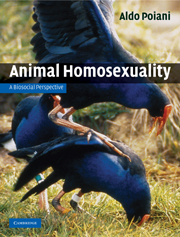Book contents
- Frontmatter
- Dedication
- Contents
- Contributors
- Acknowledgements
- Preface
- 1 Animal homosexuality in evolutionary perspective
- 2 The comparative study of homosexual behaviour
- 3 Genetics of homosexuality
- 4 Ontogenetic processes
- 5 The endocrine and nervous systems: a network of causality for homosexual behaviour
- 6 Immunology and homosexuality
- 7 Sexual segregation effects
- 8 The social, life history and ecological theatres of animal homosexual behaviour
- 9 Homosexual behaviour in primates
- 10 A Biosocial Model for the evolution and maintenance of homosexual behaviour in birds and mammals
- Appendix 1 Glossary
- Appendix 2 Predictions of the Synthetic Reproductive Skew Model of Homosexuality and results obtained in the comparative tests of the model carried out in birds and mammals
- Appendix 3 Comments on further results of comparative analyses of independent contrasts reported in the full correlation matrices of birds and mammals
- References
- Index
- Plates
8 - The social, life history and ecological theatres of animal homosexual behaviour
Published online by Cambridge University Press: 05 July 2014
- Frontmatter
- Dedication
- Contents
- Contributors
- Acknowledgements
- Preface
- 1 Animal homosexuality in evolutionary perspective
- 2 The comparative study of homosexual behaviour
- 3 Genetics of homosexuality
- 4 Ontogenetic processes
- 5 The endocrine and nervous systems: a network of causality for homosexual behaviour
- 6 Immunology and homosexuality
- 7 Sexual segregation effects
- 8 The social, life history and ecological theatres of animal homosexual behaviour
- 9 Homosexual behaviour in primates
- 10 A Biosocial Model for the evolution and maintenance of homosexual behaviour in birds and mammals
- Appendix 1 Glossary
- Appendix 2 Predictions of the Synthetic Reproductive Skew Model of Homosexuality and results obtained in the comparative tests of the model carried out in birds and mammals
- Appendix 3 Comments on further results of comparative analyses of independent contrasts reported in the full correlation matrices of birds and mammals
- References
- Index
- Plates
Summary
We have seen in Chapter 7 how variables such as mating system, sociality and, for mammals at least, sexual segregation can affect, directly or indirectly, the evolution of homosexual behaviour across species. For the bird species that were used in those analyses, same-sex mounting is positively associated with sociality and polygamy (see also MacFarlane et al. 2007), whereas in mammals same-sex mounting can increase with polygamy and be indirectly associated with sexual segregation and sociality.
This chapter explores the potential effects that a series of behavioural, ecological and life history variables exert on homosexual mounting. Apart from the variables that were already analysed in Chapter 7 in the context of sexual segregation, here I also examine the relationship between same-sex mounting and the specific sex involved (males, females or both), the adult sex ratio, dominance, affiliative behaviours, genetic relatedness, group size, ecological constraints on breeding, pair bonding, extra-pair or extra-group heterosexual copulations and, in birds, plumage sex-dichromatism. In mammals I will consider the effect of body mass sex-dimorphism. The aim is not to determine the effect of each one of those variables in isolation but to do so in the context of a broader theoretical framework. I will therefore start this chapter by introducing Reproductive Skew theory, as this provides an important starting point for a general evolutionary theory of homosexuality. Some necessary modifications that the theory should incorporate, to gain in generality, will be highlighted, and I will then briefly describe some empirical tests of the theory that have been carried out in birds and mammals. A qualitative model will subsequently be produced that directly addresses the link between the modified Reproductive Skew theory and homosexual behaviour; finally, I will test this model through comparative analyses. The chapter will also analyse some case studies in more detail and end with a section that deals with the potential effect of homosexual behaviour on the transmission of sexually transmitted pathogens.
- Type
- Chapter
- Information
- Animal HomosexualityA Biosocial Perspective, pp. 323 - 380Publisher: Cambridge University PressPrint publication year: 2010



